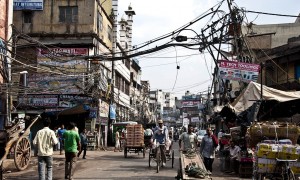For David Byrne, a former musician a now an artist, it was riding around the cities in a bike that allowed him to see things that he would have otherwise never seen, and changed who he was. This thinking was also advocated earlier in 1991 by American political scientist Robin Leblanc who said that we see cities differently depending on how we choose to move through them and that this affects what we see and how we understand things. In summery that our perspective of things can affect who we are, or in other words our identity.
There were many different points that Byrne makes in his writing, i would like to focus on a point that particularly stood out for me, the tech boom and how it revolutionized not only the economy but also how people lived and interacted. Byrne explain that in order for the dot-com boom to develop people had to be ready to live entirely online, which would have meant a major shift in how people interacted and lived their lives and most people were not prepared to do that. It was later with the Web 2.0, a more socially interactive and responsive commerce-based web sites, and wifi that allowed more mobility which meant that some of those imagined shifts might actually occur. These shifts impacted several aspects of community and interaction, the hippy community; first allowing them to have affordable houses and then later being pushed out and onto the streets, the tech boom created a social barrier for many people and circumstances, it also gradually reduced face to face interactions.
I was further intrigued by this social evolution due to technology after reading Byrne’s essay on Istanbul, where he talked about many different countries For example he mentions Turkey, Syria, Greece, Egypt and even India. I thought that one thing that all these countries have in common is a similar level of technological development. That being present, with high use of phones, computers, tv etc but that it has not taken over most daily operations like in Europe or America. This made me reflect on the kind of interactions that these countries have and their economy. Take as a specific example Istanbul, situated in Turkey it sits on top of a beautiful hill mostly surrounded by water, this active town, like many other in the countries listed above, relies on people leaving their homes and actively interacting with the community. By going to the market, instead of ordering online, or communicating by voice often to spread information, similar to how Byrne saw San Francisco before the tech boom.
In conclusion, i am left thinking, will places like Istanbul also move towards and economy that is based more on the internet as technology in their country develops? and if so what will this mean for their level of social interaction, will it go up or down?

Thank you for this, Ettore — good questions, I think. Byrne is obviously worried that if different nations all adopt similar development patterns, that we will lose the beautiful uniqueness of places.